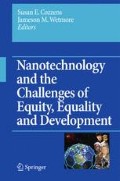Abstract
Among the high hopes surrounding nanotechnology is the hope that it will solve a number of pressing problems in developing countries. The counterpoint to that hope is the fear of a nano-divide—benefits accruing only in the global North. This volume has already included several references to possible disparities, in Foladori and Zayago Lau’s discussion of workers, Harsh’s portrayal of decision processes in Kenya, and the reprinted article on regulation of nanotechnology in Uganda that closed the last section. This chapter charts the issues involved in a more comprehensive way.
This chapter was originally published in Frtiz Allhoff and Patrick Lin (eds.), Nanotechnology & Society: Current and Emerging Ethical Issues. Dordrecht: Springer, 2008, pp. 243-263. Reprinted with permission from Springer.
Access this chapter
Tax calculation will be finalised at checkout
Purchases are for personal use only
References
Bruske-Hohlfeld, I et al. 2005. Do nanoparticles interfere with human health? GAIA 14.1: 21–23.
Cientifica. 2003. Nanoporous Materials. http://www.cientifica.com/. Cited 1 June 2007.
Colvin, V. 2002. Responsible Nanotechnology: Looking Beyond the Good News. EurekAlert. http://www.eurekalert.org/context.php?context = nano&show = essays& essaydate = 1102. Cited 1 June 2007.
ETC Group. 2004. Down on the Farm: The Impact of Nano-Scale Technologies on Food and Agriculture (23 November 2004): http://www.etcgroup.org/en/materials/publications.html?id = 80. Cited 1 June 2007.
Goldman, L. and C. Coussens, eds. 2005. Implications of Nanotechnology for Environmental Health Research. National Academy of Sciences Roundtable on Environmental Health Sciences, Research and Medicine, Environmental Health Research. http://www.nap. edu/ catalog/11248.html. Cited 1 June 2007.
Intermediate Technology Development Group. Power to the People. http://www.itdg.org/html/ advocacy/power_to_the_people_paper.htm. Cited 28 November 2004.
Roco, M.C. 2003. Nanotechnology: Convergence with modern biology and medicine. Current Opinion in Biotechnology 14: 337–346.
Salamanca-Buentello, F et al. 2005. Nanotechnology and the Developing World. PLoS Medicine. doi: 10.1371/journal.pmed.0020097.
Scott, N and H. Chen. Nanoscale Science and Engineering for Agriculture and Food Systems. Cooperative State Research, Education and Extension Service, US Department of Agriculture.
Singh, K.A. 12 January 2007. Intellectual Property in the Nanotechnology Economy. Nanoforum. http://www.nanoforum.org/. Cited 1 June 2007.
South Centre. 2005. The Potential Impacts of Nano-Scale Technologies on Commodity Markets: The Implications for Commodity Dependent Developing Countries. Geneva, Switzerland.
UN Conference on Trade and Development. 2005. Trends in World Commodity Trade, Enhancing Africa’s Competitiveness and Generating Development Gains. Report by the UNCTAD secretariat for the 2nd Extraordinary Session of the Conference of African Union Ministers of Trade, 21–24 November, 2005, Arusha, Tanzania.
UN Millennium Project. 2004. Forging Ahead: Technological Innovation and the Millennium Development Goals. Task Force on Science, Technology, and Innovation. 8 November 2004. http://www.cid.harvard.edu/cidtech/TF10Edit11-8.pdf. Cited 1 June 2007.
UN Millennium Project. 2005. Innovation: Applying Knowledge in Development. Task Force on Science, Technology, and Innovation. http://www.unmillenniumproject.org/ reports/reports2.htm. Cited 1 June 2007.
UN Millennium Project. 2005. Health, Dignity, and Development: What Will It Take? Task Force 7 on Water and Sanitation. http://www.unmillenniumproject.org/documents/tf7interim.pdf. Cited 1 June 2007.
Author information
Authors and Affiliations
Editor information
Editors and Affiliations
Rights and permissions
Copyright information
© 2010 Springer Science+Business Media B.V.
About this chapter
Cite this chapter
Barker, T.F., Fatehi, L., Lesnick, M.T., Mealey, T.J., Raimond, R.R. (2010). Nanotechnology and the Poor: Opportunities and Risks for Developing Countries. In: Cozzens, S., Wetmore, J. (eds) Nanotechnology and the Challenges of Equity, Equality and Development. Yearbook of Nanotechnology in Society, vol 2. Springer, Dordrecht. https://doi.org/10.1007/978-90-481-9615-9_17
Download citation
DOI: https://doi.org/10.1007/978-90-481-9615-9_17
Published:
Publisher Name: Springer, Dordrecht
Print ISBN: 978-90-481-9614-2
Online ISBN: 978-90-481-9615-9
eBook Packages: Humanities, Social Sciences and LawSocial Sciences (R0)

